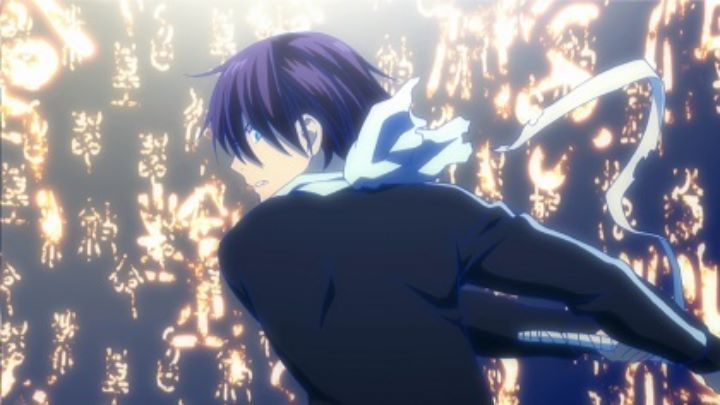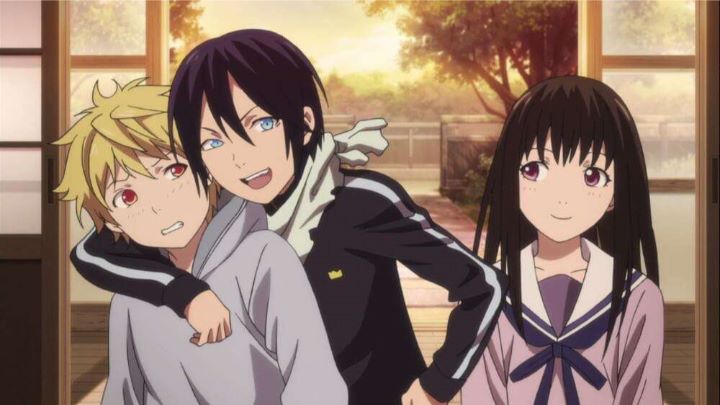








Disclaimer: this review covers "Noragami" Season 1, and "Noragami" Season 2 ("Aragoto"). Japanese culture has a lot of Gods, seemingly with the belief that all things might have a God, from an old tree to your lucky spoon. In anime, there are plenty of examples of artistic license taken to portray these Gods. But what about a homeless God barely trying to get by? Sounds original... but this, too, has been done before (see "Good Luck Girl!" or "The Devil is a Part-Timer!" as a start).Anyway, this is the plot of "Noragami," a 2014 action-comedy anime. Yato is the star God, with greasy hair, sweaty hands, always wearing a track suit and a puffy scarf. He has most abilities you might expect from a God, but is so unknown that no one knows who he is, a serious plight for Gods. So Yato works tirelessly taking any job he can, from household chores to finding lost pets, all communicated through prayer and a five-yen donation, slowly saving up the spare change to have a permanent shrine of his very own. Things get a little complicated when a school girl named Hiyori saves him from getting hit by a bus, dying in the process. Yato is able to save her, but she obtains a strange side-effect of accidently leaving her physical body, brandishing a pink tail and the flight power of a ghost. Shennanigains ensue."Noragami" is a lot of things, but is primarily a comedy (at least, for the first season). And a genuinely funny one at that. Yato is a hard-working moocher, and there are a few good scenes where he seems to appear out of nowhere. But "Noragami" shines a bit better in its world-building. Yes, it's following common beats to get there, but the world and its otherworldly beings are fascinating to learn about. New details are presented every episode. For example, various spirit monsters roam the country of Japan, secretly inflicting pain or bad feelings on humans. Gods like Yato rely on Regailia to act as their weapons, shape-shifting lost spirits given a name and a home when a God forms a bond with them. Regailia were once humans too, and have emotions and personalities that may make them wish to leave their God: some such spirits become "Nora," stray spirits with no home, available for hire on temporary, often dirty, tasks. Names are given a high importance to spirits and Gods, as a form of control, and as one of the only things keeping one from fading away to oblivion. Season one ends with a good climax, but introduces a lot of questions that, normally, would remain unanswered in the television adaption of a manga. That's the impressive thing about Season two, "Aragoto," which means "rough action" (not to be confused with "arigato," which means "thank you" in Japanese, which I initially thought meant "goodbye"... I misunderstood the subtlte for the second season for some time). "Aragoto" actually expands directly onto one of the major plot threads left hanging in Season one, making for one of the most satisfying story arcs I've seen in an action show. Comparitively, the second half of "Aragoto" isn't as good, but also tries to offer a continuation of a story thread while leaving enough open for a potential third season. Overall, "Aragoto" is notably darker and more violent than the first season, and while it has its moments, it sometimes goes entire episodes without a speck of laughter. I don't know if seeing Yato go to Hell and back (literally) makes for a better show, but it was definitely engaging to watch in the moment. As much as I grew fond of the characters and appreciated the payoff in Season two, I can't deny that there is a certain workmanship quality to the storytelling, and production as a whole, and not in a good way. The pacing can be a little slow at times, relying heavily on repeated flashbacks and reused animation. Sometimes, too much exposition is used, and sometimes a important plot point is discarded quickly in a single line. The character designs at least have a cool fashion sense (although why Bishamon, the God of War and Combat, would choose to fight in a leather jacket and bikini, I'll never know), and the neon-colored monsters give a distinct flavor to the style of the show. But the animation is fairly limited, also inconsistent in quality, and with vague human faces, sometimes they animate off-model. Only in some of the action or transformation scenes does it really pick up, and again, such animations are reused often. The voice acting, even during many of the more dramatic moments, barely passes above average. Essentially, at no point did I think I was watching anything more than simply another television anime. This isn't a bad thing when seeking entertainment, but I like to seek animation that strives to be more, and many other anime do. One highlight of the show beyond the neon monster designs and story is the music. It feels surprisingly inspired and modern, utilizing electronic pop and rap. One such rap is from Lotus Juice, the same voice from the memorable fan-favorite beats of "Persona 3"... an under-used artist, but appreciated here. The opening and ending themes are also catchy, especially "Aragoto"'s "Hey Kids!" It helps sell the idea that "Noragami" is a cool show.But no matter how cool you look in a black track suit, sometimes it can't hide the sweaty loser underneath who isn't taking things seriously. "Noragami" is certainly a good show, sometimes a very good show. But a few too many glaring production flaws prevent my from giving it proper repsect.
As much as I grew fond of the characters and appreciated the payoff in Season two, I can't deny that there is a certain workmanship quality to the storytelling, and production as a whole, and not in a good way. The pacing can be a little slow at times, relying heavily on repeated flashbacks and reused animation. Sometimes, too much exposition is used, and sometimes a important plot point is discarded quickly in a single line. The character designs at least have a cool fashion sense (although why Bishamon, the God of War and Combat, would choose to fight in a leather jacket and bikini, I'll never know), and the neon-colored monsters give a distinct flavor to the style of the show. But the animation is fairly limited, also inconsistent in quality, and with vague human faces, sometimes they animate off-model. Only in some of the action or transformation scenes does it really pick up, and again, such animations are reused often. The voice acting, even during many of the more dramatic moments, barely passes above average. Essentially, at no point did I think I was watching anything more than simply another television anime. This isn't a bad thing when seeking entertainment, but I like to seek animation that strives to be more, and many other anime do. One highlight of the show beyond the neon monster designs and story is the music. It feels surprisingly inspired and modern, utilizing electronic pop and rap. One such rap is from Lotus Juice, the same voice from the memorable fan-favorite beats of "Persona 3"... an under-used artist, but appreciated here. The opening and ending themes are also catchy, especially "Aragoto"'s "Hey Kids!" It helps sell the idea that "Noragami" is a cool show.But no matter how cool you look in a black track suit, sometimes it can't hide the sweaty loser underneath who isn't taking things seriously. "Noragami" is certainly a good show, sometimes a very good show. But a few too many glaring production flaws prevent my from giving it proper repsect.